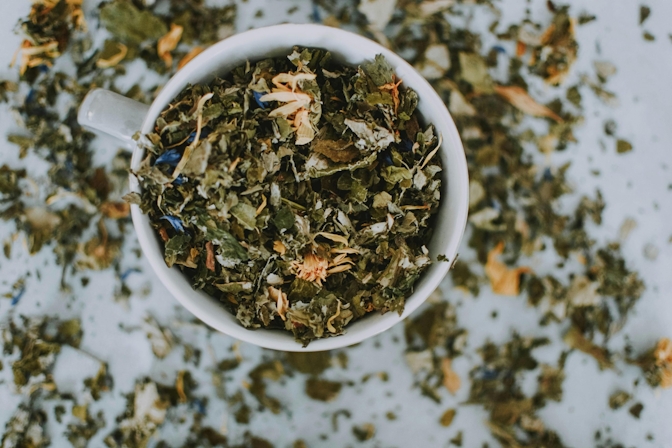
Johanneke Kroesbergen-Kamps / Unsplash
Terpenes are aromatic molecules inside plants, like cannabis, that infuse distinct scents and flavors into them.
You’ll catch the bold notes of the terpene caryophyllene in many herbs and spices, like:
Black pepper
Basil
Oregano
Cloves
Rosemary
Cinnamon
But caryophyllene doesn’t stop at the spice rack; it’s a key ingredient in hops for beer brewing and is also included in the essential oils of lavender and ylang-ylang.
In cannabis, caryophyllene offers a signature spicy, woody, and peppery profile that’s as rich in taste as it is in aroma.
How Does Caryophyllene Work?

Terpenes like caryophyllene work by directly activating cannabinoid receptors, specifically CB2 receptors, scattered throughout the body. These receptors are part of a larger network called the endocannabinoid system, which helps your body regulate many processes, like appetite, pain, mood, motor control, and even your sleep.
While caryophyllene won’t get you “high” on its own—no matter how much black pepper you sprinkle on your dinner—it plays a more important role when paired with THC in cannabis.
Terpenes like caryophyllene and cannabinoids like tetrahydrocannabinol (THC) work together to enhance the plant’s ‘high’ and therapeutic potential.
Potential Caryophyllene Benefits

Lil artsy / Pexels
Anxiety and Depression
There’s a ton of published research suggesting that caryophyllene has clinical value for treating depression and anxiety.
One particular study investigated the impact of caryophyllene treatment in mice models of anxiety and depression, finding the symptoms of these conditions were almost reversed with a single dose of the botanical terpene. This effect is attributed to the activation of CB2 receptors, which are crucial in managing mood disorders.
Anti-inflammatory and Pain-relieving
Chronic inflammation is a theme of many chronic diseases and pain conditions. A 2014 study highlighted caryophyllene’s ability to reduce mice’s long-lasting, debilitating pain states.
Similar findings in a 2020 review were underscored, as researchers found that caryophyllene does, in fact, have anti-inflammatory effects due to its ability to inhibit the key molecular players behind inflammatory responses.
The authors also dove into the potential impact of caryophyllene in conditions like diabetes, spotlighting studies that demonstrated that the terpene reduces pro-inflammatory molecules and prevents diabetes-induced-associated complications in diabetic rats.
Anti-cancer
Caryophyllene has also been found to stunt the growth of cancer cells.
A 2016 review highlighted its ability to reduce the expression of cancerous genes and proteins while encouraging cancer cell death. The experiments covered various cell types, including those from human breast, colon, and pancreatic cancers.
Much of the research on caryophyllene’s benefits stems from animal and cell studies. To fully understand its effects on humans, more studies involving human subjects are necessary.
What Does Caryophyllene Feel Like In Cannabis?

Victoria Bowers / Pexels
It’s well-understood that caryophyllene-rich strains deliver a soothing sensation.
Many users experience significant relief from stress, along with aches and pains, courtesy of this terpene’s pain-relieving properties. The experience varies among individuals—some report a slight sedative effect, while others enjoy a comforting ease that doesn’t lead to couch-lock.
Typically, caryophyllene is found in hybrid or indica-leaning strains, although you may find lower levels of it in some sativa-leaning hybrid strains.
Caryophyllene Strains

Laura Ockel / Unsplash
Strains that usually contain high levels of caryophyllene include:
- Girl Scout Cookies (GSC)
- Sour Diesel
- Cookies and Cream
- Gelato
- Kush
- Death Star
- Chemdawg
- Bubba Kush
- Candyland
- The White
- Original Glue
Herb Recommended Products:
READ MORE










